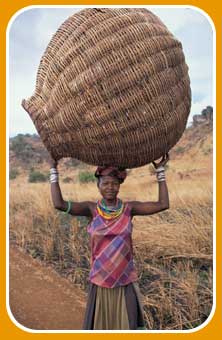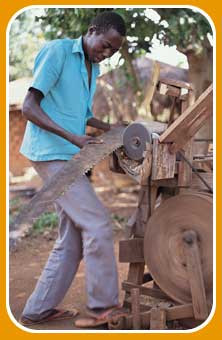| |
 to
compare the employment structure of the Ugandan and UK economies. to
compare the employment structure of the Ugandan and UK economies.
Carrying
a granary basket to store grain in Karamajong

©Crispin Hughes/Panos
Pictures |
Most Ugandans grow
food and earn money on small farms. Women grow most of
the food crops while men spend more time growing crops
to sell. Export earnings from these cash crops are the
mainstay of the economy, especially coffee, Uganda's main
export. But the dependence on a few
primary commodities makes the economy vulnerable to
international price changes. |
 to
find out how international coffee prices changed between 1997-2000. to
find out how international coffee prices changed between 1997-2000.
| Uganda depends on
the sale of
primary commodities for 91% of its export earnings,
especially coffee and fish. Click on the highlighted countries
on the map to find out the percentage of export earnings
from
primary commodities in other African countries. |
|
How will dependence
primary commodities affect these countries?
Why is it difficult for poorer countries to shake off this
dependence?
With falling primary
commodity prices, Uganda relies on aid and debt relief. To
improve the quality of life of poorer Ugandans, more money
is being spent on health care, water
and sanitation, schools and the road network.
| Ugandans do not
just rely on outside help. Self-help is important too.
People use their own skills to help themselves, like making
this lathe and grinder to sharpen tools. |

©Nick Robinson/Panos
Pictures. |
The north of Uganda is poorer
than the rest of the country. An ongoing conflict between the
Ugandan army and a rebel group is a major cause of poverty here.
Go to the Eye on People page to find
out more. |
|





